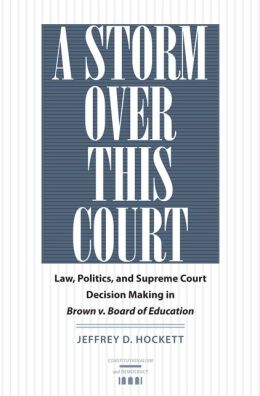New from the University of Virginia Press:
A Storm Over This Court: Law, Politics, and Supreme Court Decision Making in "Brown v. Board of Education," by
Jeffrey D. Hockett (University of Tulsa). Here's a description from the publisher:
On the way to offering a new analysis of the basis of the Supreme Court’s iconic decision in Brown v. Board of Education,
Jeffrey Hockett critiques an array of theories that have arisen to
explain it and Supreme Court decision making generally. Drawing upon
justices’ books, articles, correspondence, memoranda, and draft
opinions, A Storm over This Court demonstrates that the puzzle of Brown’s basis cannot be explained by any one theory.
Borrowing
insights from numerous approaches to analyzing Supreme Court decision
making, this study reveals the inaccuracy of the popular perception that
most of the justices merely acted upon a shared, liberal preference for
an egalitarian society when they held that racial segregation in public
education violates the equal protection clause of the Fourteenth
Amendment. A majority of the justices were motivated, instead, by
institutional considerations, including a recognition of the need to
present a united front in such a controversial case, a sense that the
Court had a significant role to play in international affairs during the
Cold War, and a belief that the Court had an important mission to
counter racial injustice in American politics.
A Storm over This Court
demonstrates that the infusion of justices’ personal policy preferences
into the abstract language of the Constitution is not the only
alternative to an originalist approach to constitutional interpretation.
Ultimately, Hockett concludes that the justices' decisions in Brown
resist any single, elegant explanation. To fully explain this watershed
decision—and, by implication, others—it is necessary to employ a range
of approaches dictated by the case in question.
A blurb:
Examining oral arguments, Supreme Court memoranda, and the private
papers of the justices, Hockett weaves a rich tapestry of the many
threads that led the nine Supreme Court justices to unanimously hold
school segregation unconstitutional in Brown v. Board of Education.
Focusing on the thinking of each justice, Hockett offers a fascinating
examination of judicial sausage-making in one of the Court’s most famous
decisions. -- Gerald N. Rosenberg
It looks like full text is available to subscribers of
Project Muse.
